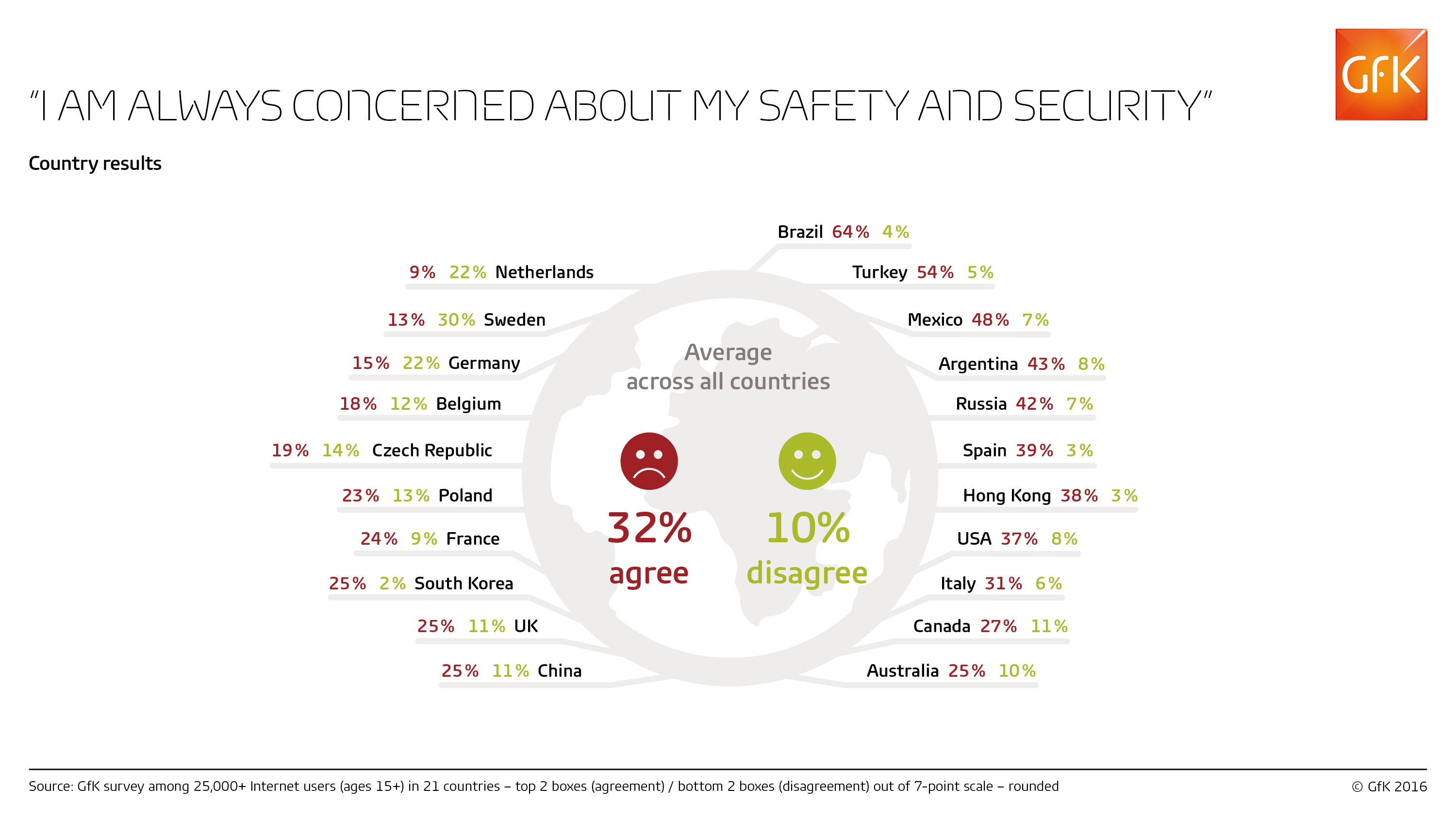Close to a third (32 percent) of the online population across 21 countriesfirmly agree they are always concerned about their safety and security, compared to ten percent who firmly indicate that they are not.
GfK asked over 25,000 people online how strongly, on a seven point scale, they agree or disagree with the statement, “I am always concerned about my safety and security”. Looking at the top-two boxes (agree) and bottom two boxes (disagree) allows businesses to understand those countries and audience segments with the strongest concerns around safety, in order to identify business opportunities and design offers that support the specific needs within each market.
Latin American countries, Turkey and Russia are in the top five for numbers who are always concerned
In Brazil and Turkey, over half of the respondents gave a ‘top two’ agreement indicating that they are always concerned about their safety and security: Brazil standing at 64 percent and Turkey at 54 percent of their online populations. They are followed by Mexico at 48 percent, with Argentina (43 percent) and Russia (42 percent) not far behind.
For the Latin American countries and Russia, this correlates with the higher levels of violent crime and homicide recorded in these countries, while Turkey’slevel of concern is likely to be the effect of a perceived risk of being affected by terror attacks.
Sweden, Germany and Netherlands have highest levels of perceived personal safety
By contrast, Sweden, Germany and the Netherlands show the highest percentages who firmly disagreed with the ‘always concerned’ statement – indicating higher perceptions of personal safety in those countries. In Sweden, 30 percent firmly disagreed with the statement, followed by Germany and Netherlands at 22 percent each.
In Sweden it is the men who lead on feeling secure, with a third (34 percent) of men firmly disagreeing with the ‘always concerned’ statement, compared to just a quarter (26 percent) of women. In Germany and the Netherlands, those is more evenly divided, standing in Germany at 24 percent of men and 20 percent women and, in the Netherlands, at 23 percent of men and 21 percent of women.

Women not always more safety concerned than men
Internationally, women are slightly more likely than men to state firmly that they are always concerned about their safety and security – standing at 34 percent of women compared to 30 percent of men; just four percentage points difference.
Looking at individual countries, the biggest gender differences are seen in Turkey, Russia, and Spain, which all show 12 percentage points difference in the number of women always concerned versus the number of men.
However, in Hong Kong, Belgium and the Netherlands, it is the men, not the women, who show slightly higher numbers saying they are always concerned. In Hong Kong, 39 percent of men firmly agree with the statement (three percentage points more than for women), while Belgium stands at 18 percent of men (one percentage point higher) and in the Netherlands it is 11 percent of men (four percentage points higher).
Age has little impact on concerns for personal safety
Those aged 20-29 and 30-39 years old are the most likely to agree firmly that they are always concerned about safety, standing at a third (33 percent) of each age group. But there is very little difference between these and the other age groups. Amongst 40-49 year olds, 32 percent say they are always concerned, while for those aged 60 or over it is 31 percent. Teenagers (15-19 years old) stand at 30 percent, followed by those aged 50-59 at 29 percent.
To download the complete findings for each of the 21 countries, please visit http://www.gfk.com/global-studies/global-study-overview/
